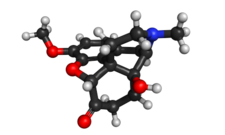羥考酮
羥考酮(英語:oxycodone)或譯奧施康定,是一種用於緩解疼痛的口服阿片類藥物,於1916年首次在德國製成。[7]它具有高度成癮性[8],因此容易被濫用。 [9][10][9]服用藥物後該藥在十五分鐘內就能開始緩解疼痛,藥效可以持續六個小時。[9]
 | |
 | |
| 臨床資料 | |
|---|---|
| 讀音 | ɒksɪˈkəʊdəʊn |
| 商品名 | OxyContin, Endone, others |
| 其他名稱 | Eukodal, eucodal; dihydrohydroxycodeinone, 7,8-dihydro-14-hydroxycodeinone, 6-deoxy-7,8-dihydro-14-hydroxy-3-O-methyl-6-oxomorphine[1] |
| AHFS/Drugs.com | Monograph |
| MedlinePlus | a682132 |
| 核准狀況 | |
| 懷孕分級 | |
| 依賴性 | 高[3] |
| 給藥途徑 | 口服給藥, 口腔黏膜吸收, 肌肉注射, 靜脈注射, 鼻腔給藥, 皮下注射, 經皮給藥, 直腸給藥, 硬脊膜外麻醉[4] |
| ATC碼 | |
| 法律規範狀態 | |
| 法律規範 |
|
| 藥物動力學數據 | |
| 生物利用度 | 口服: 60–87%[5][6] |
| 血漿蛋白結合率 | 45%[5] |
| 排泄途徑 | 尿 (83%)[5] |
| 識別資訊 | |
| |
| CAS號 | 76-42-6 |
| PubChem CID | |
| IUPHAR/BPS | |
| DrugBank | |
| ChemSpider | |
| UNII | |
| KEGG | |
| ChEBI | |
| ChEMBL | |
| CompTox Dashboard (EPA) | |
| ECHA InfoCard | 100.000.874 |
| 化學資訊 | |
| 化學式 | C18H21NO4 |
| 摩爾質量 | 315.37 g·mol−1 |
| 3D模型(JSmol) | |
| 熔點 | 219 °C(426 °F) |
| 水溶性 | 166 (HCl) |
| |
| |
該藥常見的副作用有欣快、便秘、噁心、嘔吐、食欲不振、嗜睡、頭暈、瘙癢、口乾和出汗。[9]嚴重的副作用可能包括上癮、物質依賴、物質濫用、易怒、抑鬱、狂躁、譫妄、幻覺、換氣不足、心跳過緩和低血壓。[9]
參考文獻
編輯- ^ O'Neil MJ (編). The Merck index 14th. Whitehouse Station, NJ: Merck & Co. 2006. ISBN 978-0-911910-00-1.
- ^ Oxycodone Use During Pregnancy. Drugs.com. 14 October 2019 [12 April 2020]. (原始內容存檔於2020-06-19).
- ^ Bonewit-West K, Hunt SA, Applegate E. Today's Medical Assistant: Clinical and Administrative Procedures. Elsevier Health Sciences. 2012: 571 [2022-07-10]. ISBN 978-1-4557-0150-6. (原始內容存檔於2020-07-28) (英語).
- ^ Kalso E. Oxycodone. Journal of Pain and Symptom Management. May 2005, 29 (5 Suppl): S47–S56. PMID 15907646. doi:10.1016/j.jpainsymman.2005.01.010 .
- ^ 5.0 5.1 5.2 Roxicodone, OxyContin (oxycodone) dosing, indications, interactions, adverse effects, and more. Medscape Reference. WebMD. [8 April 2014]. (原始內容存檔於2014-04-13).
- ^ Elliott JA, Smith HS. Handbook of Acute Pain Management. CRC Press. 19 April 2016: 82– [2022-07-10]. ISBN 978-1-4665-9635-1. (原始內容存檔於2021-04-17).
- ^ Drug discovery: a history. Hoboken, NJ: Wiley. 2005: 119. ISBN 978-0-471-89980-8.
- ^ Remillard D, Kaye AD, McAnally H. Oxycodone's Unparalleled Addictive Potential: Is it Time for a Moratorium?. Current Pain and Headache Reports. February 2019, 23 (2): 15. PMID 30820686. S2CID 73488265. doi:10.1007/s11916-019-0751-7.
- ^ 9.0 9.1 9.2 9.3 9.4 Oxycodone Monograph for Professionals. Drugs.com. AHFS. [28 December 2018]. (原始內容存檔於2018-12-28).
- ^ Pergolizzi JV, Taylor R, LeQuang JA, Raffa RB. Managing severe pain and abuse potential: the potential impact of a new abuse-deterrent formulation oxycodone/naltrexone extended-release product. Journal of Pain Research. 2018, 11: 301–311. PMC 5810535 . PMID 29445297. doi:10.2147/JPR.S127602.